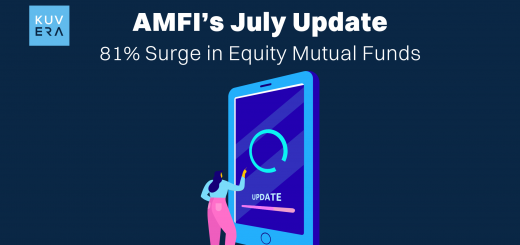There are many investment avenues to park your funds and achieve the goal of capital appreciation. Mutual funds are one such investment option that is gaining traction among millennial investors due to their stability and high return potential. To know about factors affecting the performance of mutual funds, read on!
Factors Affecting the Performance of Mutual Funds.
Here are some factors affecting a mutual fund’s performance:
-
Performance of the underlying securities
A mutual fund may invest in multiple asset classes, for example, debt and equity. The performance of a scheme depends on the fund’s asset allocation and its investment objective. Hence, the performance of a mutual fund is directly related to how these underlying securities are performing.
For example, let’s say that a mutual fund invests 75% of its total corpus in equity and equity-related instruments. At the same time, the rest of the financial assets are allocated to debt instruments.
In such a case, the performance of mutual funds will get affected during market downturns. However, efficient managers use diversification tactics to reduce portfolio risk. They invest in equities of different sectors and geographies. This reduces the chances of a drastic fall in performance in case markets of one country witness a downturn. A well-diversified portfolio plays a vital role in generating stable and decent returns.
-
Any Economic changes occurring in sectors or industries
One has to keep track of economic trends emerging in any sector. Economic changes in any particular industry can affect a fund’s performance positively or negatively. Changes in government policy towards a sector will have a bearing on the stock price of companies in that sector. This will also affect the Net Asset Value (NAV) of a mutual fund if the scheme has invested its fund corpus in those stocks.
For example, if there is a favorable policy change for real estate, there will be an uptick in house demand. This will increase the demand for cement, steel, and other construction materials. Hence prices of these stocks will see rapid growth. So mutual funds units investing in these stocks will see positive returns.
Similarly, during the COVID-19 pandemic, the stock price of various drugs and pharmaceutical companies saw exponential growth in their stock price. So those mutual funds investing in equity instruments of these companies saw positive growth in their value.
-
Fund manager’s performance:
A fund manager and their team handle every mutual fund professionally. Hence, a fund’s performance greatly depends on how the manager and his team are performing. Decisions and strategies taken by fund managers will have a crucial impact on a fund’s performance.
They must carry out regular analysis and review of their portfolio and make necessary adjustments. Investors must go for a mutual fund that is handled by an experienced fund manager with a proven track record. An experienced fund manager will know how to maneuver tricky situations and keep investors’ money safe.
-
Expense ratio
Total expense ratio or simply expense ratio is fees or costs that an asset management company imposes on its investors. It includes commission, brokerage fees, operational expenses, etc. These charges help in running a mutual fund scheme. The expense ratio plays a crucial role in determining the returns earned by an investor.
Higher expense ratios will translate to lower profits, and lower expense ratios will increase the return potential of a mutual fund. Investors must thoroughly read the scheme-related documents and check these charges before investing.
-
Total assets of a fund
The total size of a fund or assets under management plays an important role in determining a fund’s performance. Asset management companies must ensure that the size of the fund must not be so large that the portfolio becomes unmanageable.
On the other hand, if a fund size is too small, it will not give enough leverage to managers to maneuver their holdings. It is crucial to maintain a well-balanced AUM. It should not be too small or too large, as the fund’s size directly affects the performance or returns that a fund can generate.
-
Cash flows
Cash inflow of a mutual fund means the amount of money invested in a particular mutual fund scheme. If a fund sees a massive influx of investment, then it gives managers optimal resources to diversify their portfolio by investing across various sectors and geographies.
Therefore, positive cash flows in any fund will see better performance. If a fund witnesses too many redemption requests due to negative investor sentiments, then the manager or AMC will have to sell off the securities to honor the requests. This will mean poor fund performance due to a lack of resources to diversify the portfolio.
Final Word
Performance of mutual funds depends on the factors discussed above. Investors must analyse the current performance of the fund before investing their money. If it is a new scheme, then the past performance and strategies adopted by AMCs must be considered to check whether they align with your investment goals.
Start your investment journey with a zero commission, a zero-brokerage platform like Kuvera. You can open a free mutual fund account at Kuvera and start investing from direct plans of 40+ AMCs.
Frequently Asked Questions
-
What are large cap equity funds?
Large cap Equity funds invest a significant portion of their fund corpus in large-cap companies. These companies include the top 100 companies in terms of market capitalisation. They are the most stable option among equity mutual funds over a long period.
-
What is a mutual fund’s Net Asset Value (NAV)?
NAV is the market value of a particular mutual fund scheme on any given date. This denotes the market value of underlying securities of that scheme. It varies daily depending on how stocks perform on stock exchanges during trading hours.
-
What are small cap funds?
Small cap funds invest a significant portion of their fund corpus in stocks of small-cap companies. These include companies ranked below 250 in terms of market capitalization. These funds are highly volatile and not suitable for risk-averse investors.
Interested in how we think about the markets?
Read more: Zen And The Art Of Investing
Watch/hear on YouTube:
Start investing through a platform that brings goal planning and investing to your fingertips. Visit Kuvera.in to discover Direct Plans and Fixed Deposits and start investing today.
#MutualFundSahiHai #KuveraSabseSahiHai!











